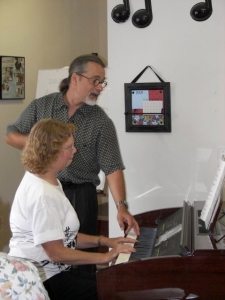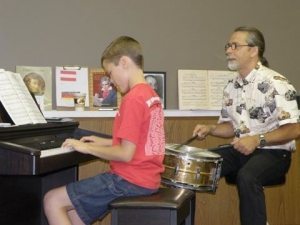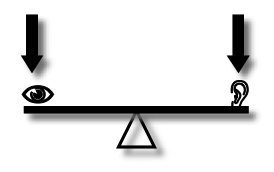I’m always excited when there is an organized effort to help students and teachers foster the creativity that is already in them and us. Here at the beginning of the 21st century, I am seeing a shift in our profession in the area of reading music and improvising. Have you noticed how many of the methods have started incorporating more improvisation exercises in their books? If you were at MTNA, you might have noticed that there was standing room only for the pop/jazz track of pedagogy Saturday! Deep down inside, we all know that kids love to create their own music. And deeper still is the desire that we adults have to create and enjoy our creations.
Unfortunately, if you are a classical musician trained in the 20th Century, you might be fearful of improvising, composing, or just doodling at the piano. There just wasn’t an emphasis on these kinds of things in many traditional piano studios in the 20th Century. But, if I told you that improvising was possible for every pianist and that you could learn how to do it in a non-threatening way, would you try it?
Well, you have just that opportunity! I’m going to let Leila Viss and Bradley Sowash tell you all about it. But, I must first tell you that I have tremendous respect for these two musicians and can assure you that anything they do together will be a smashing success. They were the brains and the feet behind the jazz/pop track of Pedagogy Saturday and I’ve only heard raving reviews. See what you think about this great opportunity for your students and yourself!
Give us a short description of the opportunities you are offering this summer.
Eye players read music; Ear players improvise. To broaden their musical creativity and stylistic range, contemporary musicians need instruction in both. 88 Creative Keys was established to help students, musicians and educators balance their traditional skills with further training in creative music making.
The 88 Creative Keys camps and clinics will help you:
- Play well known tunes using both by ear and with lead sheets
- Personalize music by embellishing melodies and improvising variations
- Interpret pop/jazz chord symbols and apply stylistic accompaniments
- Understand practical music theory tips as a means to playing more creatively
Tell me about your backgrounds and your personal vision for the camps:
From Bradley Sowash:
“In my career as a creative musician, I have had several titles – jazz pianist, composer, arranger, recording artist, collaborator, and accompanist – that taught me important principles about making music creatively. Although better understood now than they were a few decades ago, these concepts are still not widely accessible. How I wish someone had shown me these things as a student. My teachers explained how to read music, but my understanding of how to create music was gained much more slowly through experimentation, mimicking recordings, analyzing live performances, querying knowledgeable musicians, and learning music theory from books and articles. With 88 Creative Keys camps and clinics I am passing along the valuable lessons I have learned along the way so that others can find the means to make their own brand of music more efficiently than I did.”
From Leila Viss:
“With a Master’s degree in piano performance and pedagogy, I thought I was prepped for a career in music. The security in the MA behind my name was shattered (not an exaggeration) when someone approached me with a chord chart. I had never seen one before, nor could I interpret it and was from then on determined to seek balance in my skills as a musician. My understanding of how to read chord charts and play beyond the page was gained by learning from others’ arrangements, putting my theory into practice and attending sessions such as those led by master teachers/artists like Bradley Sowash. My mission is that every one of my students will secure a solid background in reading the classics, as well as experience creating from lead sheets, composing and improvising. It is an honor to be a co-founder of 88 Creative Keys with Bradley Sowash and promote a healthy balance of traditional skills and creative music making.”
Do you have a program or a list of topics/skills that you will cover?
In keeping with our western theme this year, here’s what we’ll be up to:
- Round Pen: Play and improvise tunes by ear together as a large group
- Rope Tricks: Learn and apply some music theory “nuggets”
- Small Herds: Rehearse in small groups called Wranglers, Buckaroos or Cowboys and play for each other.
- Unsaddled: “Off the bench” activities away from the keyboard.
- Stock Show: Share our music for friends and family on the last day.
Behind that fun description oriented to students, the real nuts and bolts of the curriculum will include:
- Learning melodies and chords by ear
- Applying embellishment techniques to personalize melodies
- Understanding contemporary pop/jazz chord symbols
- Internalizing and transposing “pocket progressions” using Roman numerals
- Exploring both free and structured improvised solos alone and with others.
- Interpreting lead sheets to create small group collaborative arrangements
- Large group whole body activities away from the keyboard to reinforce rhythmic awareness, playing together and listening.
How can I be sure that this event will be worth a plane ticket and housing costs?
 With so many free workshops available at music stores and conferences, that’s a fair question. In a nutshell, the difference here is that the training will be hands-on. I think we’ve all had enough of the talking head behind a podium showing a power point or the “educational session” that is actually a barely veiled advertisement for a book series. Improvisation is something you have to DO! We have a large batch of keyboards being provided by local retailer Schmitt Music so ALL of the students and teachers who attend 88 Creative Keys can immediately try out the new concepts they learn.
With so many free workshops available at music stores and conferences, that’s a fair question. In a nutshell, the difference here is that the training will be hands-on. I think we’ve all had enough of the talking head behind a podium showing a power point or the “educational session” that is actually a barely veiled advertisement for a book series. Improvisation is something you have to DO! We have a large batch of keyboards being provided by local retailer Schmitt Music so ALL of the students and teachers who attend 88 Creative Keys can immediately try out the new concepts they learn.
Are you offering this event at other places in the country? What if my state or local association is interested in having you do this for us?
We have already had several inquires from teachers interested in hosting an 88 Creative Keys workshop in their area. We are preparing a plan for potential hosts including a “how to” checklist and the possibility of back end support to make it as easy as possible. All good things are worth waiting for. We will make this available in August after the camp. In the meantime, we invite those who are interested in any aspect of this endeavor to get in touch with us and also to enjoy the free creative teaching tips at our blog and newsletter here: http://88creativekeys.com
Why should I bother trying to learn how to improvise or create at this stage in my life?
It seems the old model of only teaching the “masters” using only the written page is finally giving way to a more balanced approach. I can get even more dramatic by declaring, “The eye/ear revolution™ has begun!” When Wynton Marsalis won Grammy Awards® for both jazz and classical records in 1983, the invisible fence between reading and improvising musicians was torn down. Today’s musicians may read a fully notated piece one night and make up their part from a chord sheet in a band the next. Whether you are a musician or music teacher, you have to deal with improvisation alongside traditional skills in order to remain relevant. It’s that simple. Fortunately, playing off-page is a blast. Smiles always abound in my clinics and private teaching once folks get over the hump of self-judgment. And if teachers start students improvising early enough, it becomes as natural a way for them to make music as any other.
Is this really a “jazz” camp? What if my students or I don’t really care for jazz?
 What I teach is creative music making. It’s easy for us in the reading world to forget that this is the oldest way make music. When you consider all the world music traditions that get passed down by rote and all the self-taught “hobby” musicians copying recordings and videos, it is probably also still the most prevalent way to learn. Remember also that up until about the time of Mendelssohn, all classical musicians, and especially, keyboardists were expected to improvise. As European classical music became more and more interpretive, American jazz rescued creative performance. And now it is coming full circle as more and more classical performers are embracing innovative programming.
What I teach is creative music making. It’s easy for us in the reading world to forget that this is the oldest way make music. When you consider all the world music traditions that get passed down by rote and all the self-taught “hobby” musicians copying recordings and videos, it is probably also still the most prevalent way to learn. Remember also that up until about the time of Mendelssohn, all classical musicians, and especially, keyboardists were expected to improvise. As European classical music became more and more interpretive, American jazz rescued creative performance. And now it is coming full circle as more and more classical performers are embracing innovative programming.
So while I understand that for some, jazz is a style, for me, it is an approach to making music creatively. As the granddaddy of American music, its offspring encompasses pop, rock, blue grass, boogie-woogie and increasingly, contemporary classical music among many others. What all of these styles share is an emphasis on spontaneous personal expression through the applied knowledge of chords, scales and rhythms. If you understand how to do that, you are free to pursue any creative style you like and that’s what 88 Creative Keys is all about.
As a teacher, can I do both the Clinic: Beyond the Page AND the church music session: How Sweet the Sound: Amazing Chords for Church Musicians? Or do these sessions conflict?
Teachers can take both absolutely. The teacher-training track is oriented toward how to introduce these concepts to younger or less-experienced students. It’s about “how to teach.” The tracks for church musicians and adult classical musicians are aimed at a higher level to feed the musician within the teacher. Whenever I instruct teachers in my home studio, which I often do, they are torn between wanting to learn how to teach basic concepts and wanting to go deeper so they can get better at this themselves. I don’t blame them. Who doesn’t want to learn cool chord substitutions, gospel/pop grooves and bluesy fills? Its all so much fun!
Regarding dates, the church musician and teacher training tracks are separated by a few days. Teachers who are interested in attending both are invited to observe the student camp for a nominal auditing fee.
Here’s the schedule:
How Sweet the Sound; Amazing Chords (for teachers or advanced students)
July 28 2:00-5:00pm
Camp: Play it Your Way (for students)
July 29 – August 1, 2013, 8:30 – noon
Workshop: Teaching Creativity (for teachers)
August 2-3, 2013, 9:00 a.m. – 12 noon
Clinic: Beyond the Page (for adult classical musicians)
August 2-3, 2013, 1:30 – 4:30 p.m
Go ahead and overcome your fear of improvising this summer! I know you’ll be glad you did.


Oh, how I wish I didn’t live in India so I could attend this! I try to teach creativity at the piano (even though I wasn’t taught how) and am always in need of extra guidance and tips. This is sure to be an exceptional event.